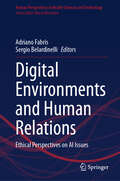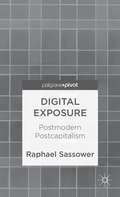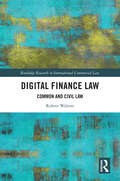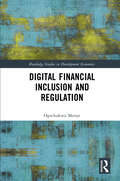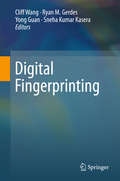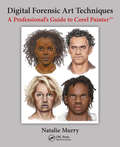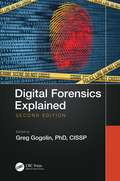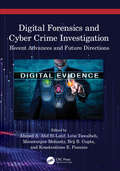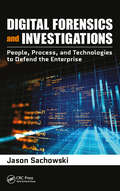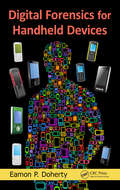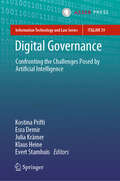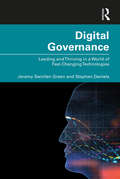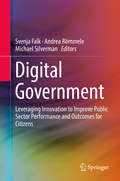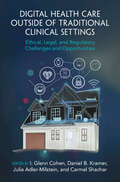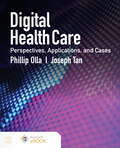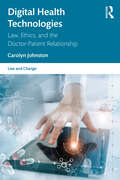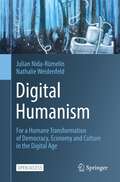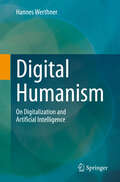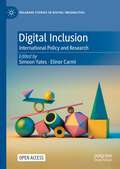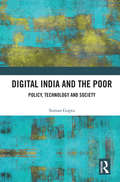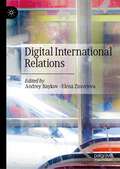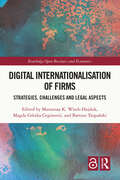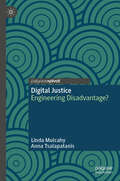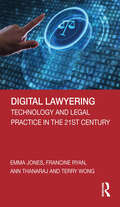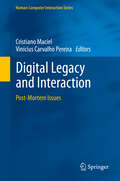- Table View
- List View
Digital Environments and Human Relations: Ethical Perspectives on AI Issues (Human Perspectives in Health Sciences and Technology #150)
by Adriano Fabris Sergio BelardinelliIn Digital Environments and Human Ecology: New Perspectives on AI Issues, editors and contributors embark on a multidisciplinary exploration of how artificial intelligence (AI) is reshaping the landscapes of human interactions, societal structures, and individual and collective psychologies. Discussing if and to what extent the digital environment can be considered an extension of our environment, this book investigates the profound implications of AI's integration into our daily life, emphasizing the need for a harmonious coexistence between technological advancements and human-centric values, stressing the importance of sustainability in digital development and, therefore, a renewed Human Ecology. By weaving together insights from computer science, social sciences, philosophy, and environmental studies, this book offers a comprehensive and nuanced understanding of the complex relationship between humans and technology. It serves as a vital resource for policymakers, technologists, scholars, and anyone interested in the ethical and ecological implications of digital technologies in our lives.
Digital Exposure: Postmodern Postcapitalism
by Raphael SassowerThis book adopts an explicitly postmodernist perspective of the digital revolution. While exploring issues relating to the re-creation of social life in the digital world, its main focus is on the political economy and in particular the extent to which the paradigms of capitalism and socialism can be mapped as postcapitalism onto this new world.
Digital Finance Law: Common and Civil Law (Routledge Research in International Commercial Law)
by Robert WaltersThis book assesses the rapidly changing landscape of digital finance regulation. Focusing on the laws of banking-finance, tax, insurance, intellectual property (patents and copyright) and international commercial arbitration, it also delves into the regulation of tokens and the laws pertaining to its development, use, and transaction.The book undertakes a comparative study of civil and common law jurisdictions such as Australia, India, Japan, Singapore, United Kingdom, European Union, and the United States. It explores how each jurisdiction is at various stages of developing its digital economy and providing banking and financial regulations for crypto-digital assets such as tokens. It also highlights the potential for global regulatory change and collaboration, such that there is a robust, efficient, and harmonised framework of standards, codes and law. The book asserts that blockchain technology will be a disruptive force to commercial law and will be important to taxation and insurance laws (smart contracts), as well as the technology that supports them. Due to the rapid transformation in regulatory landscape, the laws compared were as at November 2024. Since then there have been changes. It also expands on how international arbitration agreements will require more extensive knowledge on data and cybersecurity due to the use of expert evidence that involves blockchain, code, and cybersecurity, amongst other technological elements that facilitate smart contracts and token transactions.A book of keen interest to scholars of finance law, digital finance, and comparative law, as well as legal practitioners.
Digital Financial Inclusion and Regulation (Routledge Studies in Development Economics)
by Ogochukwu MonyeThis book explores the various considerations for achieving an effective regulatory strategy to improve financial access and usage in Nigeria and beyond. Gaps in the legal and institutional framework for digital financial services (DFS) as well as the barriers that contribute to financial exclusion are identified as are the policy changes needed to provide more extensive, accessible and sustainable financial inclusion value. In addition, the book covers divergent themes around the use of and insights for regulating industry financial services providers and challenger entities that herald industry disruption. The book adopts three research methods. The doctrinal research method is used to buttress the law and development analysis and the themes around regulation, adoption and usage of financial services. To elucidate the application of financial innovations, comparative case studies are drawn from selected jurisdictions including Kenya, South Africa, Ghana, The Philippines, Brazil, Mexico, Uganda, Pakistan, India, and Bangladesh. Lastly, using the empirical research method, the author reports the burden experienced by the residents of a community without banks in accessing finance. Included in this discussion are the barriers to finance as well as the coping strategies adopted by the community residents to access formal and informal finance.
Digital Fingerprinting
by Cliff Wang Ryan M. Gerdes Yong Guan Sneha Kumar KaseraThis is the first book on digital fingerprinting that comprehensively covers the major areas of study in a range of information security areas including authentication schemes, intrusion detection, forensic analysis and more. Available techniques for assurance are limited and authentication schemes are potentially vulnerable to the theft of digital tokens or secrets. Intrusion detection can be thwarted by spoofing or impersonating devices, and forensic analysis is incapable of demonstrably tying a particular device to specific digital evidence. This book presents an innovative and effective approach that addresses these concerns. This book introduces the origins and scientific underpinnings of digital fingerprinting. It also proposes a unified framework for digital fingerprinting, evaluates methodologies and includes examples and case studies. The last chapter of this book covers the future directions of digital fingerprinting. This book is designed for practitioners and researchers working in the security field and military. Advanced-level students focused on computer science and engineering will find this book beneficial as secondary textbook or reference.
Digital Forensic Art Techniques: A Professional’s Guide to Corel Painter
by Natalie MurryDigital Forensic Art Techniques: A Professional’s Guide to Corel PainterTM illustrates hands-on techniques to digitally create forensic art for police and investigative purposes. Coverage focuses specifically on how to utilize the software to create realistic human likenesses, including composites of suspects and drawings of persons in unidentified remains cases. Drawing digitally is like using any tool in art: a pencil, a charcoal stick, a conte’ crayon. A stylus is just another tool to master. Digital work is easier for artists to send to the case detective, and the work always reproduces exactly as it was completed. Another benefit to working digitally is that one can use video conferencing with a witness online to provide services remotely world-wide. This enables police departments who have never had access to a forensic artist to have a sketch done within hours of the crime. Chapters address the more basic functions to serve as a primer for those transitioning to working digitally. There is also instruction on light and shadow, and bones and muscles of the skull. All of the discussion is intended to make the reader see things as an artist to improve drawing skills and overall digital techniques. In short, Digital Forensic Art Techniques is a practical, easy-to-follow manual for working forensic artists that will give readers a solid base from which to start. It serves as an essential resource to greater skill and comfort with the hardware and software, thus furthering current best practices and technological advances in the field.
Digital Forensics Explained
by Greg GogolinThis book covers the full life cycle of conducting a mobile and computer digital forensic examination, including planning and performing an investigation as well as report writing and testifying. Case reviews in corporate, civil, and criminal situations are also described from both prosecution and defense perspectives. Digital Forensics Explained, Second Edition draws from years of experience in local, state, federal, and international environments and highlights the challenges inherent in deficient cyber security practices. Topics include the importance of following the scientific method and verification, legal and ethical issues, planning an investigation (including tools and techniques), incident response, case project management and authorization, social media and internet, cloud, anti-forensics, link and visual analysis, and psychological considerations. The book is a valuable resource for the academic environment, law enforcement, those in the legal profession, and those working in the cyber security field. Case reviews include cyber security breaches, anti-forensic challenges, child exploitation, and social media investigations. Greg Gogolin, PhD, CISSP, is a Professor of Information Security and Intelligence at Ferris State University and a licensed Professional Investigator. He has worked more than 100 cases in criminal, civil, and corporate environments.
Digital Forensics and Cyber Crime Investigation: Recent Advances and Future Directions
by Manoranjan Mohanty Brij B. Gupta Lo’ai Tawalbeh Ahmed A. Abd El-Latif Konstantinos E. PsannisIn the ever-evolving landscape of digital forensics and cybercrime investigation, staying ahead with the latest advancements is not just advantageous—it’s imperative. Digital Forensics and Cyber Crime Investigation: Recent Advances and Future Directions serves as a crucial bridge, connecting the dots between the present knowledge base and the fast-paced developments in this dynamic field. Through a collection of meticulous research and expert insights, this book dissects various facets of digital forensics and cyber security, providing readers with a comprehensive look at current trends and future possibilities. Distinguished by its in-depth analysis and forward-looking perspective, this volume sets itself apart as an indispensable resource for those keen on navigating the complexities of securing the digital domain. Key features of this book include: Innovative Strategies for Web Application Security: Insights into Moving Target Defense (MTD) techniques Blockchain Applications in Smart Cities: An examination of how blockchain technology can fortify data security and trust Latest Developments in Digital Forensics: A thorough overview of cutting-edge techniques and methodologies Advancements in Intrusion Detection: The role of Convolutional Neural Networks (CNN) in enhancing network security Augmented Reality in Crime Scene Investigations: How AR technology is transforming forensic science Emerging Techniques for Data Protection: From chaotic watermarking in multimedia to deep learning models for forgery detection This book aims to serve as a beacon for practitioners, researchers, and students who are navigating the intricate world of digital forensics and cyber security. By offering a blend of recent advancements and speculative future directions, it not only enriches the reader’s understanding of the subject matter but also inspires innovative thinking and applications in the field. Whether you’re a seasoned investigator, an academic, or a technology enthusiast, Digital Forensics and Cyber Crime Investigation: Recent Advances and Future Directions promises to be a valuable addition to your collection, pushing the boundaries of what’s possible in digital forensics and beyond.
Digital Forensics and Investigations: People, Process, and Technologies to Defend the Enterprise
by Jason SachowskiDigital forensics has been a discipline of Information Security for decades now. Its principles, methodologies, and techniques have remained consistent despite the evolution of technology, and, ultimately, it and can be applied to any form of digital data. However, within a corporate environment, digital forensic professionals are particularly challenged. They must maintain the legal admissibility and forensic viability of digital evidence in support of a broad range of different business functions that include incident response, electronic discovery (ediscovery), and ensuring the controls and accountability of such information across networks. Digital Forensics and Investigations: People, Process, and Technologies to Defend the Enterprise provides the methodologies and strategies necessary for these key business functions to seamlessly integrate digital forensic capabilities to guarantee the admissibility and integrity of digital evidence. In many books, the focus on digital evidence is primarily in the technical, software, and investigative elements, of which there are numerous publications. What tends to get overlooked are the people and process elements within the organization. Taking a step back, the book outlines the importance of integrating and accounting for the people, process, and technology components of digital forensics. In essence, to establish a holistic paradigm—and best-practice procedure and policy approach—to defending the enterprise. This book serves as a roadmap for professionals to successfully integrate an organization’s people, process, and technology with other key business functions in an enterprise’s digital forensic capabilities.
Digital Forensics for Handheld Devices
by Eamon P. DohertyApproximately 80 percent of the worlds population now owns a cell phone, which can hold evidence or contain logs about communications concerning a crime. Cameras, PDAs, and GPS devices can also contain information related to corporate policy infractions and crimes. Aimed to prepare investigators in the public and private sectors, Digital Forensics
Digital Governance: Confronting the Challenges Posed by Artificial Intelligence (Information Technology and Law Series #39)
by Klaus Heine Kostina Prifti Esra Demir Julia Krämer Evert StamhuisThis book explores the structure and frameworks of digital governance, focusing on various regulatory patterns, with the aim of tackling the disruptive impact of artificial intelligence (AI) technologies. Addressing the various challenges posed by AI technologies, this book explores potential avenues for crafting legal remedies and solutions, spanning liability of AI, platform governance, and the implications for data protection and privacy. The book is valuable for audiences with or without a technological background. Primarily, it targets academic scholars from a variety of disciplines, including law, ethics, sociology, political science, economics, computer science, and engineering. Particularly, academics interested in interdisciplinary and transdisciplinary studies would benefit from the mixture of disciplines in the book. The scholarly insights in this work are valuable also for policymakers and civil society, by providing potential guidance for effective AI regulation. Additionally, the book can be useful to private companies and organisations that are involved in designing AI applications, offering practical insights and guidance about the legal and societal implications of AI. Kostina Prifti, Esra Demir and Julia Krämer are PhD candidates at Erasmus School of Law, Rotterdam, the Netherlands. Klaus Heine is Professor of Law and Economics at Erasmus School of Law, Rotterdam, the Netherlands. Evert Stamhuis is Professor of Law and Innovation at Erasmus School of Law, Rotterdam, the Netherlands. Chapter 2, Chapter 6, Chapter 10, and Chapter 13 are available open access under a via link.springer.com.
Digital Governance: Leading and Thriving in a World of Fast-Changing Technologies
by Stephen Daniels Jeremy Swinfen GreenDigital Governance provides managers with a simple and jargon-free introduction to the impact that digital technology can have on the governance of their organisations. Digital technology is at the heart of any enterprise today, changing business processes and the way we work. But this technology is often used inefficiently, riskily or inappropriately. Worse perhaps, many organisational leaders fail to grasp the opportunities it offers and thus fail to "transform" their organisations through the use of technology. This book provides an explanation of the basic issues around the opportunities and risks associated with digital technology. It describes the role that digital technology can play across organisations (and not just behind the locked doors of the IT department), giving boards and top management the insight to develop strategies for investing in and exploiting digital technology as well as arming them with the knowledge required to ask the right questions of specialists and to detect when the answers given are evasive or irrelevant. International in its scope, this essential book covers the fundamental principles of digital governance such as leadership, capability, accountability for value creation and transparency of reporting, integrity and ethical behaviour.
Digital Government: Leveraging Innovation to Improve Public Sector Performance and Outcomes for Citizens
by Svenja Falk, Andrea Römmele and Michael SilvermanThis book focuses on the implementation of digital strategies in the public sectors in the US, Mexico, Brazil, India and Germany. The case studies presented examine different digital projects by looking at their impact as well as their alignment with their national governments’ digital strategies. The contributors assess the current state of digital government, analyze the contribution of digital technologies in achieving outcomes for citizens, discuss ways to measure digitalization and address the question of how governments oversee the legal and regulatory obligations of information technology. The book argues that most countries formulate good strategies for digital government, but do not effectively prescribe and implement corresponding policies and programs. Showing specific programs that deliver results can help policy makers, knowledge specialists and public-sector researchers to develop best practices for future national strategies.
Digital Health Care outside of Traditional Clinical Settings: Ethical, Legal, and Regulatory Challenges and Opportunities
by I. Glenn Cohen Carmel Shachar Daniel B. Kramer Julia Adler-MilsteinHealth care delivery is shifting away from the clinic and into the home. Even prior to the COVID-19 pandemic, the use of telehealth, wearable sensors, ambient surveillance, and other products was on the rise. In the coming years, patients will increasingly interact with digital products at every stage of their care, such as using wearable sensors to monitor changes in temperature or blood pressure, conducting self-directed testing before virtually meeting with a physician for a diagnosis, and using smart pills to document their adherence to prescribed treatments. This volume reflects on the explosion of at-home digital health care and explores the ethical, legal, regulatory, and reimbursement impacts of this shift away from the 20th-century focus on clinics and hospitals towards a more modern health care model. This title is also available as Open Access on Cambridge Core.
Digital Health Care: Perspectives, Applications, and Cases
by Joseph Tan Phillip OllaDigital Health Care: Perspectives, Applications, and Cases explores the trends, perspectives, and cases of Digital Healthcare and Informatics (DHI) that are transforming healthcare across the globe.Organized in 5 major connecting parts, this well-conceived text begins by laying out foundational DHI themes before focusing in on key DHI core technologies, developments, methods and challenges - from big data analytics & artificial intelligence to security and privacy issues, clinical decision support systems, consumer health informatics, and more. It then explores DHI emerging technologies (e.g. sensors and wearable electronics), and concludes with short case studies and critical case questions designed to reinforce conceptual understanding.Written for undergraduates health professionals, this accessible text offers a multidisciplinary perspective that is suitable for use in variety of healthcare disciplines-from allied health and nursing to health administration, public health, and health informatics. Each chapter follows a consistent structure that comprehensively covers a specific DHI topic(s) and related key technological components along with workplace practices from a multidisciplinary perspective.Real world cases studies (in Part 5) help students understand key and illustrate how they can been applied in real-world settings.Clinical innovations and techniques for evaluating clinical outcomes, such as improved care, performance improvement, and cost reduction in clinical settings, are explored and emphasized throughout the text.Technology and issues that a transforming the health care industry are explored including standardization, artificial intelligence (AI), cloud computing, medical sensors, enterprise architectures, and precision medicine.Navigate eBook Access (included with the printed text) provides online or offline access to the digital text from your computer, tablet, or mobile device Healthcare InformaticsHealthcare information technology Healthcare systems analysis and designInformation Systems for allied healthNursing Informatics © 2023 | 350 pages
Digital Health Technologies: Law, Ethics, and the Doctor-Patient Relationship (Law and Change)
by Carolyn JohnstonIncreasingly digital technologies are used in healthcare. This book explores eight digital health technologies, situated the context of a life span, from high-throughput genomic sequencing technologies and do-it-yourself (DIY) insulin delivery for diabetes management in paediatrics, to the use of robotic care assistants for older adults and digital advance care decisions. A scene-setting case scenario at the start of each chapter describes the digital technology and identifies the sometimes competing interests of the key stakeholders. Broad themes of resource allocation, access to technologies, informed consent, privacy of health data and ethical concerns are considered in context, alongside analysis of legal duties owed by healthcare professionals to act in their patients’ best interests. This book addresses legal and ethical issues arising from the use of emerging digital health technologies and is of interest to academics, clinicians and regulators and anyone interested in the development of health technologies and the challenges they may present. It focusses on the Australian legal framework, with some comparison to other jurisdictions.
Digital Humanism: For a Humane Transformation of Democracy, Economy and Culture in the Digital Age
by Julian Nida-Rümelin Nathalie WeidenfeldThis open access book deals with cultural and philosophical aspects of artificial intelligence (AI) and pleads for a “digital humanism”. This term is beginning to be en vogue everywhere. Due to a growing discontentment with the way digitalization is being used in the world, particularly formulated by former heroes of Internet, social media and search engine companies, philosophical as well as industrial thought leaders begin to plead for a humane use of digital tools. Yet the term “digital humanism” is a particular terminology that lacks a sound conceptual and philosophical basis and needs clarification still – and this gap is exactly filled by this book. It propagates a vision of society in which digitization is used to strengthen human self-determination, autonomy and dignity and whose time has come to be propagated throughout the world. The advantage of this book is that it is philosophically sound and yet written in a way that will make it accessible for everybody interested in the subject. Every chapters begins with a film scene illustrating a precise philosophical problem with AI and how we look at it – making the book not only readable, but even entertaining. And after having read the book the reader will have a clear vision of what it means to live in a world where digitization and AI are central technologies for a better and more humane civilization.
Digital Humanism: On Digitalization and Artificial Intelligence
by Hannes WerthnerInformation technology (IT) is changing us, our society and our world, and it influences how we perceive the world and how we think about it. This book describes the rather complex development of IT over the last 70 years, highlights the dynamics of this process, and critically reflects on both ongoing technical and related societal changes. The book discusses fundamental developments in informatics, looks at recent &“game changers&” like artificial intelligence and the Web with their dynamics and their repercussions on our lives and on society, which are at the same time – like so many new technologies in the history of mankind – both positive and negative. It explains and analyzes the complex interplay of technology and humans, and it also tries to point us towards a sustainable society and a better life respecting human rights. To this end, it introduces Digital Humanism, a holistic and proactive approach that focuses on the analysis of this process and the integration of technical and social innovation. This is a science communication book, written for a broad readership and assumes no specific prior knowledge, just an interest in the subject. It provides a framework for how to use IT reasonably, consciously, sensibly, and sustainably – in accordance with human rights and the UN&’s Sustainable Development Goals.
Digital Inclusion: International Policy and Research (Palgrave Studies in Digital Inequalities)
by Simeon Yates Elinor CarmiThis collection presents policy and research that addresses digital inequalities, access, and skills, from multiple international perspectives. With a special focus on the impact of the COVID-19, the collection is based on the 2021 Digital Inclusion, Policy and Research Conference, with chapters from both academia and civic organizations.The COVID-19 pandemic has changed citizens’ relationship with digital technologies for the foreseeable future. Many people’s main channels of communication were transferred to digital services, platforms, and apps. Everything ‘went online’: our families, friends, partners, health, work, news, politics, culture, arts and protesting. Yet access to digital technologies remained highly unequal. This brought digital inclusion policy and research to the fore, highlighting to policymakers and the public the ‘hidden’ challenges and impacts of digital exclusion and inequalities. The cutting-edge volume offers research findings and policycase studies that explore digital inclusion from the provision of basic access to digital, via education and digital literacy, and on to issues of gender and technology. Case studies are drawn from varied sources including the UK, Australia, South America, and Eastern Europe, providing a valuable resource in the pursuit of social equity and justice.This is an open access book.
Digital India and the Poor: Policy, Technology and Society
by Suman GuptaDigital India and The Poor examines how the poor are evoked in contemporary Indian political discourse. It studies the ways in which the disadvantaged are accounted for in the increasingly digitised political economy, commercial and public policy, media, and academic research. This book: Interrogates the category of the poor in India and how they have come to be classified in economic and policy documents over the past few decades Explores the influential digital education technology ‘experiments’ conducted in Indian slums from the late 1990s, now popularly known as the ‘hole-in-the-wall experiments’ Discusses financial inclusion initiatives, predominantly as they converged between 2014 and 2017, such as the Jan Dhan Yojana, the Aadhaar Project, and the banknote demonetisation Presents an in-depth study of the bearing of technology on domestic employment in India The book will be of great interest to scholars and researchers of South Asian studies, politics, political science and sociology, technology studies, linguistics, and development studies.
Digital International Relations
by Andrey Baykov Elena ZinovievaThe book is the beginning of new interdisciplinary research series at the intersection of international relations, diplomacy, law, economics, and politics on the basis of global digital transformation. Digital international relations form a new mode of interaction between states and in terms of solving the most pressing problems of modernity. Law, economics, diplomacy and education are selected as key areas of human activity that can become the sphere of perspective research of digital international relations. This book will interest diplomats, scholars of international relations, and of international law.
Digital Internationalisation of Firms: Strategies, Challenges and Legal Aspects (Routledge Open Business and Economics)
by Witek-Hajduk, Marzanna K. Magda Górska Grginović Bartosz TargańskiDigital Internationalisation of Firms offers a comprehensive examination of the digital outward internationalisation of firms, focusing on both Internet-based and Internet-enabled businesses, including SMEs and large enterprises. This monograph provides in-depth analysis of the processes, modes, and strategies firms employ to expand internationally in the digital age. It also addresses key challenges, including legal aspects of cross-border e-commerce (CBEC), making it a vital resource for those navigating the complexities of global digital markets. This book offers a multifaceted approach to digital internationalisation, covering theoretical perspectives, practical strategies, and empirical evidence. It provides valuable insights into e-consumer behavior, big data, and sustainability challenges. The inclusion of legal considerations, such as consumer rights, tax regulations, and intellectual property protection, distinguishes this work from other publications in the field.Readers will gain a holistic understanding of the digital internationalisation process, from strategy formulation to navigating legal hurdles, and the book is ideal for academics, researchers, and advanced students in international business, marketing, and law. It also serves as a valuable resource for business managers, advisors, and policymakers seeking to understand the intricacies of digital internationalisation and the legal frameworks that influence cross-border e-commerce.
Digital Justice: Engineering Disadvantage? (Palgrave Socio-Legal Studies)
by Linda Mulcahy Anna TsalapatanisThis book explores an increasingly important issue for legal systems across the world. It asks what do we lose and gain when legal proceedings go online? Adopting a multi-disciplinary socio-legal perspective, it draws on an emerging body of empirical evidence from the UK, Australia, Canada and the US about the ways in which digital justice is being conceived of and experienced. Insights are drawn from across the social sciences to discuss the interface of digitalisation with a range of issues such as due process, procedural justice, digital disadvantage, ceremony and ritual, science and technology studies and the dematerialisation of the civic sphere. Written accessibly and provocatively, it poses questions from a variety of different perspective with a particular focus on marginalised groups.
Digital Lawyering: Technology and Legal Practice in the 21st Century
by Emma Jones Francine Ryan Ann Thanaraj Terry WongIn today’s rapidly changing legal landscape, becoming a digital lawyer is vital to success within the legal profession. This textbook provides an accessible and thorough introduction to digital lawyering, present and future, and a toolkit for gaining the key attributes and skills required to utilise technology within legal practice effectively. Digital technologies have already begun a radical transformation of the legal profession and the justice system. Digital Lawyering introduces students to all key topics, from the role of blockchain to the use of digital evidence in courtrooms, supported by contemporary case studies and integrated, interactive activities. The book considers specific forms of technology, such as Big Data, analytics and artificial intelligence, but also broader issues including regulation, privacy and ethics. It encourages students to explore the impact of digital lawyering upon professional identity, and to consider the emerging skills and competencies employers now require. Using this textbook will allow students to identify, discuss and reflect on emerging issues and trends within digital lawyering in a critical and informed manner, drawing on both its theoretical basis and accounts of its use in legal practice. Digital Lawyering is ideal for use as a main textbook on modules focused on technology and law, and as a supplementary textbook on modules covering lawyering and legal skills more generally.
Digital Legacy and Interaction
by Cristiano Maciel Vinícius Carvalho PereiraThe views of leading researchers on the emerging topic of post-mortem digital legacy and posthumous interaction are explored in this book which combines the technical, cultural and legal aspects associated with this new branch of HCI. The technical aspects of emerging technologies, both for the web and mobile platforms, are analysed and useful information is provided for system development, requirements engineering, and data management and storage. The authors address the cultural aspects of virtual identity, ethical problems, cross-culture differences regarding memories and death, bereavement, taboos and beliefs, and the visual/verbal representations of death. The legal aspects covered include regulation, property, privacy and conflicts between international and local jurisdictions. The coverage of Digital Legacy and Interaction: Post-Mortem Issues is relevant to the development of systems that consider the influence of death, bereavement and mortality on Human Computer Interaction. The interdisciplinary approach that guides this book is intended to foster enriching and innovative discussions amongst HCI scholars and professionals. Cristiano Maciel and Vinícius Carvalho Pereira are researchers at LAVI (Laboratory of Interactive Virtual Environments) and professors at UFMT (Federal University of Mato Grosso, Brazil).
